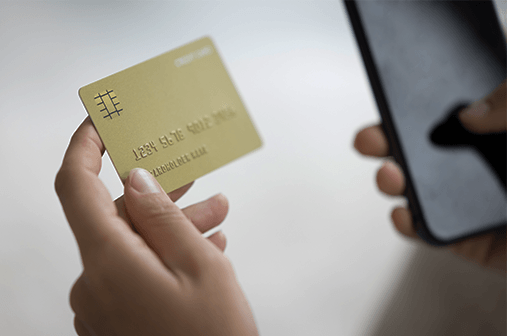In this article
Check your credit score today
Check your score and get tips to improve it. It’s free, forever.
What happens if I don't activate a credit card?
Activating your credit card is a key element. Read on to find out more.

In this article
Check your credit score today
Check your score and get tips to improve it. It’s free, forever.
How to choose a credit card is only half the battle.
Once you have applied for a card and received it, it is time to activate it.
But what happens if you ignore the instruction to activate your credit card? Are credit card activation reminders from card issuers a mandatory requirement to comply with, or can you skip it? Here’s everything you need to know:
Credit card activation is essential to recognise you as a legitimate cardholder. Unless you activate the card, you won’t be able to use it for any online or offline transactions. It is also a security measure to prevent misuse since you need to confirm your details to activate it. If anyone is wrongly in possession of your credit card, which is inactive, they won’t be able to activate it or use it. Without activating your card, you won’t be able to access any perks or benefits offered by your credit card company. In other words, activation is a key element of how do credit cards work.
Given the uptick in digital transactions, card issuers have put in place additional requirements, such as activation, to provide more protection to cardholders. Before card activate was prescribed by credit card issuers, cardholders needed to sign the reverse of the card before using it. At the time of checkout, merchants would compare the signature of the customer with the signature on the back of the card to validate the transaction.
If I don't activate a credit card, what happens to my credit score? -- this is a common question that may cross your mind once you receive your credit card. Leaving your credit card inactive after receiving it can impact your credit score in various ways.
Since your card carries an annual fee, not activating your card means you run the risk of missing this payment which, in turn, ruins your credit score.
And even if no fees are charged, you may still end up with credit score issues. For example, the issuer can shut down a card that has been inactive for a long time. The account closure can impact your credit score as it modifies your credit history, a key element considered for calculating your score. When you apply for a new credit product, lenders prefer borrowers with a long credit history. So any changes in your credit history because you don’t activate the card can impact your chances of future borrowing.
If you opt not to activate a credit card and the issuer closes your account, your credit utilisation ratio plays a significant role in calculating credit scores. The lower your ratio, the better your score. Cancellation of inactive cards can increase the ratio and reduce your credit score.
You may be wondering -- if you don't activate a credit card, what happens?
Not activating your card is different from closing down or cancelling your credit card account. Yet, you may face repercussions, including but not limited to the following:
Reduced credit score
Your credit score may decrease when you have a card you haven’t activated. Whenever you open a new credit card account, the details about the credit limit are provided to various credit reporting bureaus. Moreover, keeping your credit card inactive doesn’t help you to undo any damage from frequent hard inquiries by lenders when you apply for any credit product.
If your card remains inactive for a long period, the card issuer may close down your account. When that happens, your credit limit reduces, and your credit utilisation increases. Since the credit utilisation ratio is responsible for 30% of your credit score, high credit utilisation can bring down your score.
Wondering what my credit score is? Sign up with ClearScore, which provides you access to your credit report and score for free. You can log on to check your details at your convenience.
Late fees and interest accrues
If you have transferred a balance to your new credit card but forgot to activate it, the credit card issuer still charges you a penalty and interest. Over time, this can add up and impact your credit score.
Pay annual fees without enjoying any benefits
Once the card issuer opens your account, you are liable to pay the annual joining fees even though you may not be using your card. Skipping annual fee payments is a default and lowers your credit score.
It is possible that you may have a credit card, but you don’t want to use it. In such cases, the best course of action is to contact the card issuer and submit a request for cancelling credit card. Australian laws allow customers to request card issuers to cancel their credit cards once they are issued. Therefore, before you activate the card issued by ANZ, you can request its cancellation.
That said, cancelling your card may not always be ideal for your credit score. If you are worried about having a credit card, which makes it incredibly easy to accumulate a huge debt quickly, cancelling may still do more harm than good. This is because it leads to a high credit utilisation ratio, reducing your credit score. On the other hand, having an active credit card and using it responsibly can do wonders for building up your credit score and increasing your chances of securing a borrowing on favourable terms.
While considering the pros and cons of credit cards, take into account the fact that while you can cancel a card after it is issued, you may still have to face unfavourable consequences.
How much time you have to activate bank card depends on the terms and conditions of the card issuer. Typically, most credit card issuers provide anywhere between 45 to 60 days for credit card activation. The time starts ticking right from the day your credit account opens. Sometimes, lenders may reach out to remind you to activate credit cards though there is no guarantee they would always do that.
Therefore, you should activate your credit card as soon as you receive it. Otherwise, you may face issues with your card and need to contact the card issuer for a new card.
In case you are receiving a new credit card since your old one is expiring, you need not wait till the expiry date. You can activate the credit card as soon as you receive it and destroy the old one.
Wondering how to activate credit card easily? Most card issuers send instructions for activation along with the card. You can either do it online through the website or by calling your card issuer. For example, if you want to know how to activate ANZ card, read through the instructions provided with your ANZ card.
What do I need to do to activate my card via phone? Make sure to use the same number listed on the application. This helps the card issuer to confirm your identification details.
If you already have a credit card from the issuer, you can activate the new card through the mobile app of the issuer. And how long does it take for a card to activate? While the exact time varies depending on the card issuer, it can take approximately 48 hours for credit card activation. The time taken for activation can also depend on the type of credit card you are applying for. For example, the activation time for ANZ rewards black card and other types of credit cards issued by ANZ may not be the same.
To conclude, if you plan to apply for a credit card, remember that not activating it can pose additional problems. Keeping your card inactive for a long time can increase your chances of falling prey to credit card fraud.
Before you apply for credit card, keep in mind that you only stand to benefit if you activate it on time.
Nidhi spreads the word about how awesome ClearScore is.
